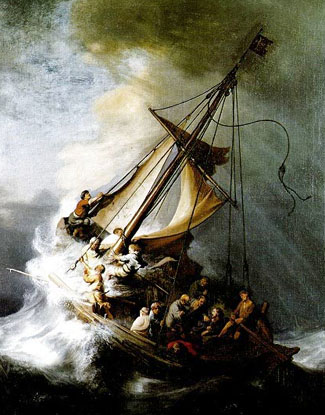In the Jewish story God was always the "highly unpredictable element...He remained free and sovereign." Because God had promised that He would return to His people in power and glory and establish His rule on earth, they, of course, hoped and assumed "that this would simply underwrite their national aspirations...They wanted a divine hurricane simply to reinforce their already overheated high-pressure system." The prophets, however, kept warning that God would act on His own terms and that His people, as much as others, would be under judgment.
 Jesus believed that He came embodying this return of Israel's God in power and glory. But it was a different kind of power and glory, and the leaders of the Jews had no clue about its implications. "The harsh wind of western empire would blast away the Temple itself, the central symbol of national identity and the building that made Jerusalem what it was, because Jerusalem and its leaders had not recognized the moment when God was visiting them, was coming back to them in person."
Jesus believed that He came embodying this return of Israel's God in power and glory. But it was a different kind of power and glory, and the leaders of the Jews had no clue about its implications. "The harsh wind of western empire would blast away the Temple itself, the central symbol of national identity and the building that made Jerusalem what it was, because Jerusalem and its leaders had not recognized the moment when God was visiting them, was coming back to them in person."And so the third dangerous element in this first-century perfect storm was the wind of God, and God's dreams were not the same as the nationalistic dreams of the Jews. He had created Israel so that through Israel He could redeem the world, but Israel itself needed to be redeemed as well! All through His public years Jesus was embodying the redeeming love of God but Israel's leaders couldn't see it. "...as we watch the events of Jesus's final days unfold, we cannot simply look on and register them as an odd quirk of history...the hurricane of divine love met the cold might of empire and the overheated aspiration of Israel. Only when we reflect on that combination do we begin to understand the meaning of Jesus's death."
Wright then goes to some length to explain what was building in the Jewish mind and desire related to who should be king and what it would look like for God to be king. As Jesus was growing up there was a political/religious movement that said "it was time for God alone to be king." The people were weary of their own kings and were increasingly speaking and writing about God Himself being their king and coming to straighten everything out.
The author goes through several Scriptures to point out what the people envisioned if God were king: Psa. 145:1, 10-13; Isa. 52:7-10; Psa. 23:1-2; 80:1-2; Ez. 34:2-6, 11-12, 14-16, 23-24, 30-31; Psa. 2:1-2, 4-9, etc. The idea of YHWH being king raises many questions, such as: "what will this mean in practice? What will it look like?...would YHWH actually appear visibly and in person to take charge? How would it happen?...There was, after all, no obvious model for what it might look like, how it might happen that YHWH would do what all those psalms and prophets said and come in person to take charge, ruling the world, rescuing Israel, establishing his presence in the Temple, judging the nations..."
Ezekiel 34 and Zechariah 9 suggest that the divine king might come as a human king, and in Zechariah 9 there are echoes of promises made to David about the true king being king, not only of Israel, but of the whole world. "God will finally be in charge from one sea to the other...And what will it look like? Like a humble figure, riding into Jerusalem on a donkey."
The only movement that held together the themes of God's kingdom and a messianic king was Jesus' movement, and after His ascension His disciples spoke and wrote and sang songs about Him, not only as a healer and teacher and spiritual leader but as the "anointed One"...occupying the throne next to God Himself after His suffering. "...they also believed that Jesus had fulfilled the dreams of those who wanted God, and God alone, to be king. Jesus had lived and worked within the same overall story as other would-be kings of the time. But he had transformed the story around himself. In Jesus, they believed, God himself had indeed become king. Jesus had come to take charge...This claim can never be...merely religious. It involves everything, from power and politics to culture and family..."
The chapter ends by stating the puzzle that Jesus is, and the puzzle is summed up in two questions:
1) Why would anyone say this about a man who didn't do what people expected a victorious king to do? 2) What does it mean today to refer to Jesus as being king or "in charge"?
In Part Two Wright deals with what Jesus did, answering the first of these two questions in the puzzle. We'll start in on that with chapter 6 next time. God bless you!

No comments:
Post a Comment